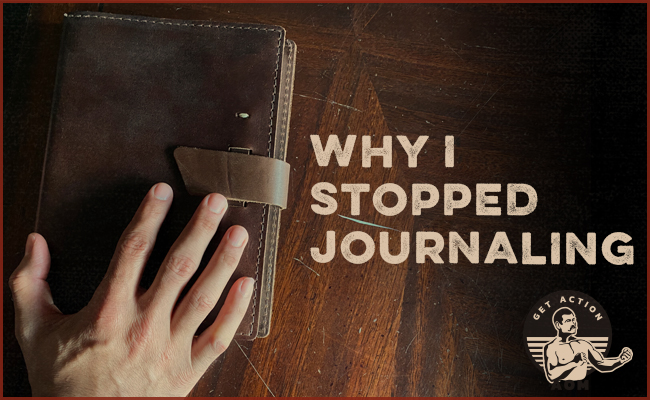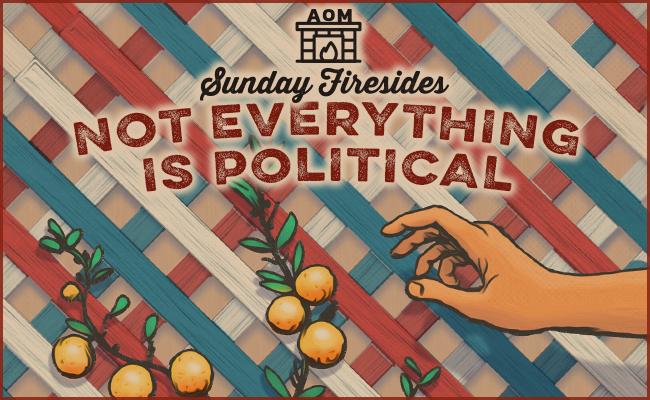
I got my first journal when I was ten years old.
My entries were short descriptions of my day. Because I was ten, those entries mainly consisted of what I ate for lunch and the Super Nintendo game I played on a given day. I’d also write about adventures to the creek that my neighborhood pals and I went on and facts about my favorite baseball player, Frank Thomas.
Every now and then, I’d offer primitive soliloquies on various themes. On Father’s Day in 1992, I wrote an encomium to fathers in general and to my father in particular. But I wasn’t a good speller (and still am not; ask Kate — she edits my writing), so it ended up being an encomium to all the great farters of the world.
I continued to journal in high school. My entries began to get deeper and more existential in that adolescent sort of way where you basically vomit words and it sounds deep, but really isn’t. But I also wrote about my high school crushes and my aspirations to start on the varsity football squad. You know, high school things.
Journaling in college took on more significance in my life. Like all young people at this age, I was making a whole host of life-changing decisions: What should I major in? Should I go to law school? When should I ask Kate to marry me?
I used my journal as a sounding board to sort out the pros and cons and the emotions which accompanied those big decisions.
Besides grappling with those impactful choices, I used my college journal to carp about the tediousness of my burgeoning adult life. I’d devote entries to ranting about balancing work and school, expressing my anxiety about money, or just complaining about how tired I was.
It was during college that I also discovered the idea of using your journal as a self-improvement tool. I’d create entries to write down my goals and my plans to achieve them. A few months later I usually had to create entries to castigate myself because I hadn’t made much progress on achieving said goals.
I continued to journal regularly throughout law school. My entries then primarily focused on being stressed out about final exams and anxiety about whether I’d get the job I wanted after graduation. Because I started AoM during this time, my journal entries discussed my goals and ambitions for the project, along with laments that it wasn’t going as planned. I also started to spill a lot of ink about being overly peevish and moody, as well as how disappointed I was in myself for being overly peevish and moody. This became a recurring trend in my journaling from here on out.
After law school, the regular journaling continued. Some days I’d write short entries of what I did that day, and other days I’d unload with multiple pages of laments about my battle with the black dog of depression, or not being as ambitious/spiritual/motivated/productive/whatever as I wanted. I’d end those diatribes with written resolves and action plans to do better. This pattern repeated itself every few months.
All during this time, I enjoyed writing in my journal. Even when I used its pages to carp, it felt good. Like a psychological purge. I felt lighter after journaling. And every now and again, I’d even get some insights and clarity on how to resolve an issue I was wrestling with.
But then a couple of years ago, I found that I was journaling less and less. I went from creating new entries every day, to every other day, to every other week, to every other month. I lost the journaling bug.
Why I Stopped Journaling
The other day Kate noticed that I hadn’t journaled in a long time and asked me why.
“I guess I just don’t feel the need to do it, and don’t enjoy it anymore,” I said.
“But why? What do you think changed?” she asked.
Great question.
I can think of three big reasons that led to me becoming a former journaler:
I don’t have to make as many big decisions. In your teens and twenties, you face a lot of crossroads: where to go to college, who to date, what to major in, what job to take, etc. You have to do a lot of figuring out who you are. Contrary to popular belief, this journey of “finding yourself” never ends, and I’ve always tried to stay committed to the idea of reflection, reevaluation, change, and growth; I never want to entirely rest on my laurels. Even so, after you get older and at least somewhat “settle down,” you don’t have to make monumental decisions with the kind of frequency you did in your youth; you move from choosing and pursuing to building and maintaining. Which is still hopefully an interesting endeavor, but not one as fraught in the deliberation department.
Since I used to journal as a help in making big choices, and now find myself having do that less often, I’ve had less of a need to journal.
I got better at managing my emotions. As I look back through my journals, most of my entries were about being stressed out, depressed, or bummed out that I wasn’t as productive or motivated as I wanted to be . . . or about being bummed out that I was bummed out. I transcribed this cycle over and over again. I thought writing about my emotions would help me process them in a more logical and linear way, allowing me better perspective on them. The idea certainly made sense on, well, paper.
But in reality, instead of helping me manage those negative emotions, journaling just seemed to reinforce the thought patterns that created them. By writing down my negative feelings, it deepened my rumination on them; it re-grooved the pathway in my brain that carried those feelings, making me more likely to neurologically travel down it again. And inscribing them “in stone,” in an “official” record, seemed to simply reinforce the idea that this was who I was — a negative and moody person.
But over the last half decade or so, I’ve looked for, and found, better ways to manage my thoughts and emotions. Rather than seeing my negative feelings and moods as alien to myself, and problems to be fixed, I just kind of sit with them. I don’t focus on them, and I don’t write about them (which only amplifies them). I just take notice of them, and know they’ll eventually pass.
I have friends now. In my twenties, my life was consumed with law school and then AoM and young kids. I didn’t have time for a social life. I didn’t have time for friends. When I needed someone to talk to, Kate was my only sounding board. But that got tiring for both of us because sometimes I was just rehashing the same life frustrations. So I branched out to sharing my thoughts with my only other buddy . . . my journal.
In my thirties, as our kids got older and more independent, and work became less frazzling, I rediscovered the time and desire for socialization, and made a concerted effort to make friends. Now that I’ve developed a few solid friendships, I’ve noticed that a lot of the stuff that I used to write in my journal, I now talk to my buddies about instead: struggles, anxieties, etc. What’s nice about human friends is that, unlike a journal, they talk back to you. You’re not just ruminating in an echo chamber. They push back when you get in a stupid negative groove, rather than silently affirming, and tacitly accepting, whatever narrative you offer.
Just because I’ve given up on journaling, doesn’t mean I think my former engagement with the practice was a waste; there were times in my life I certainly found it helpful and enjoyable. It just hasn’t been such lately. It also doesn’t mean I’m sure I’ll never journal again; there may come a time in the future where it once more becomes an enriching habit in my life.
I’ve always liked the idea of journaling, and I still do, but that doesn’t mean it’s necessarily the right thing for me, right now.
Something I’ve learned as I’ve gotten older is that your habits naturally evolve over time, and you should be open to that, regularly re-evaluating whether something that worked for you in the past is continuing to do so, and not sticking with something simply because you think you should, or because that’s what you’ve always done; there may be new practices to explore that will suit your stage in life even better, and that applies not only to journaling, but to everything else too!







